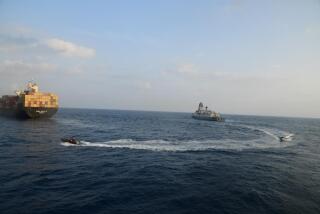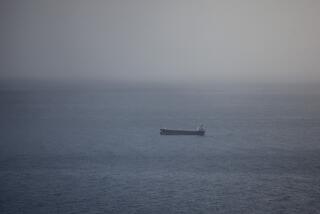S. Yemen Reported in Rebel Hands : 1,500 Foreigners Evacuated by Ship; Situation Chaotic
DJIBOUTI — Rebel forces were reported to be in control of the Marxist state of South Yemen on Sunday as ships of several nations converged on Aden, the capital, to evacuate foreigners trapped by the bloody military insurrection.
Queen Elizabeth II’s personal yacht, on its second rescue mission, plucked another 208 people from the beach.
Rear Adm. John Garnier, commander of the royal yacht Britannia, said that about 1,500 people from roughly 50 countries have been evacuated from Aden and surrounding areas but that about 1,000 others remain in the country.
After a week of heavy fighting, with several hundred reported dead, diplomats said the situation remains chaotic and predicted that the war may continue and perhaps escalate.
Uneasy Coalition
For the moment, an uneasy coalition of rebel forces appeared to have assumed power in the Arab world’s only Marxist state. The rebels were reportedly angered by strongman Ali Nasser Hasani’s move to attract aid from pro-Western Persian Gulf states like Saudi Arabia.
A cease-fire was negotiated Sunday, according to the official radio station of neighboring Yemen. However, communications with South Yemen remained cut, and it was not possible to verify the report.
Meanwhile, Hasani, who reportedly fled to Ethiopia on Saturday, was reported to have flown Sunday to Yemen to seek support from the government of President Ali Abdullah Saleh. The Yemenis, while distrustful of Hasani, are believed to favor him over the harder-line Marxist insurrectionists, diplomats said.
“The rebels were winning when we left,” said a Swedish diplomat who was evacuated from Aden on Saturday. “However, it’s still too early to say how it will turn out.”
Royal Yacht’s Mission
In its rescue mission, the royal yacht Britannia is bringing the foreigners here to the East African nation of Djibouti.
Speaking to British reporters by ship-to-shore telephone as the Britannia sailed back across the Gulf of Aden toward South Yemen, Adm. Garnier said the remaining foreigners were scattered around Aden but were moving to different locations for evacuation.
Britain’s ambassador to South Yemen, Arthur Marshall, who was returning to Aden aboard the Britannia on Sunday, told BBC Radio that the evacuation got under way Friday only after the Soviets managed to arrange a brief shaky truce between the warring Marxist factions.
“After a hellish five days, the Russians had succeeded in negotiating a kind of cease-fire for these unruly tribes and militia, with two civilian police traffic guards going up and down the beach all the time shouting through loudspeakers in Arabic to all armed personnel not to fire on civilians who where in the process of being evacuated,” Marshall said.
Some of the evacuees were forced to wade 200 yards in waist- and neck-high water to reach small boats waiting to take them to the Britannia, Marshall said.
Besides the royal yacht, Britain also had at least two warships, the frigate Jupiter and the destroyer Newcastle, and a navy supply vessel in the area. Five Soviet freighters, which rescued hundreds of Soviet citizens, and several French vessels were reported anchored about two miles offshore.
About 40 Britons are believed to remain in South Yemen, British officials said in London. State Department officials have said they have no “confirmed reports” of Americans there. Washington and Aden have no diplomatic relations.
Meanwhile, a rebel radio station, broadcasting from Aden on the same frequency as the official radio that went off the air last week, announced that the new “collective leadership” had restored order after toppling Hasani, whom it accused of trying to “monopolize power.”
However, the broadcast did not identify the new leadership--an omission that Western diplomats said could be another indication that the power struggle is far from over.
The coup leaders were said to include Deputy Prime Minister Ali Ahmed Antar; Ali Salim Bibh, local government minister, and former head of state Abdul-Fattah Ismail, a hard-line Marxist who returned last fall after five years of exile in Moscow. In the first hours of the coup attempt, the government radio reported that Antar and Ismail had been arrested and executed, but later reports cast doubt on the government account.
The three men, all doctrinaire Marxists and veterans of the frequent struggles that have brought South Yemen to the brink of open war on several occasions in the past, were said to have been opposed to Hasani’s attempts to improve strained relations with his more conservative neighbors, particularly Saudi Arabia and Oman.
Western diplomats and other officials who arrived in Djibouti from Aden on Saturday predicted that the rebel alliance may not last long.
A Western aid official evacuated by the Britannia on Saturday said the combatants had already split into several factions that in turn were fighting among themselves.
“It’s not just the government against the rebels. It’s everybody fighting among themselves,” said the official, who asked not to be quoted by name. “The tanks in the city are controlled by forces loyal to Ali Antar. Ismail seems to have the people’s militia, while the state security forces are loyal to Ali Nasser Hasani.”
Caught in the middle of this factional morass is the Soviet Union, which maintains a large military base in Aden.
Diplomatic sources said the Soviets sent Ismail home last fall in an apparent attempt to prevent Hasani from opening up to the West and to conservative Arab states.
However, in trying to manipulate factional rivalries, the Soviets seem to have “seriously underestimated” the strife that would ensue, the diplomat added. They are now trying to mediate an end to the crisis as well as to help other foreigners leave the embattled capital.
Those who made the 160-mile sea journey here across the Gulf of Aden on Friday and Saturday told harrowing tales of being trapped under heavy fire and of fierce fighting throughout the city.
The Western aid official, demanding anonymity, said that when he was evacuated Saturday afternoon, “continuous night and day fighting” was still taking place.
“Bullets were whizzing by everywhere,” he said. “They were using ammunition like you wouldn’t believe. It was madness--total warfare.”
Gloria Thygesen of Calgary, Canada, said that when she left aboard a Soviet ship on Friday, the Russians did “a wonderful job of protecting us and getting all the women and children out” but that there were still some frightening moments when the evacuees had to wade through a heavy surf to reach the lifeboats.
“I was helping an elderly woman who didn’t know how to swim, but just as we reached the lifeboat, we were separated by a wave that must have been six feet high. We were both dragged under, but we were both saved by Russian sailors. They were very organized. They knew what they were doing,” she said.
Among those whose luck did not last long enough to make it to safety were several Palestinians who the aid official said barged their way into one of the boats for women and children only. However, when they got to Djibouti, local authorities refused to let them disembark.
More to Read
Sign up for Essential California
The most important California stories and recommendations in your inbox every morning.
You may occasionally receive promotional content from the Los Angeles Times.










